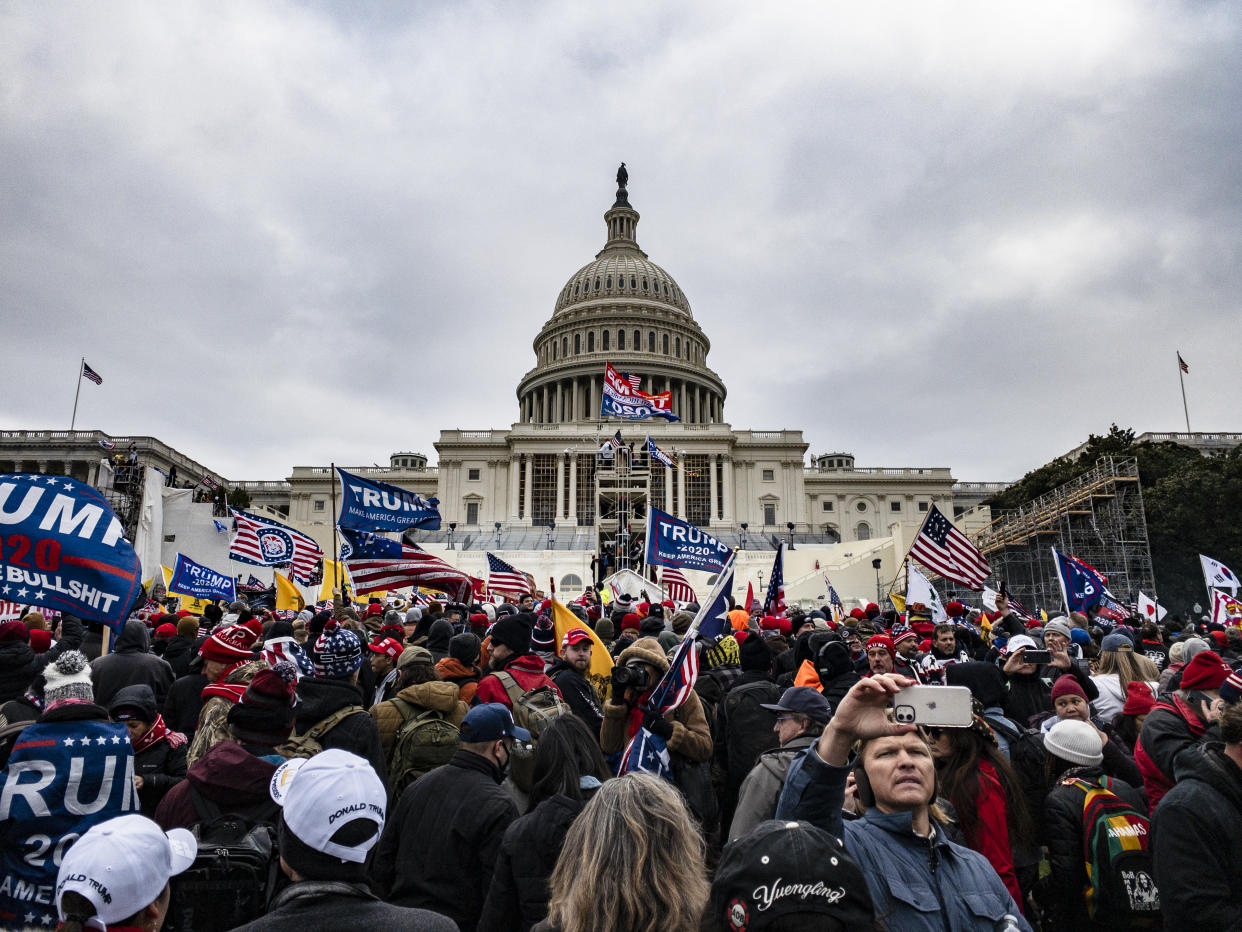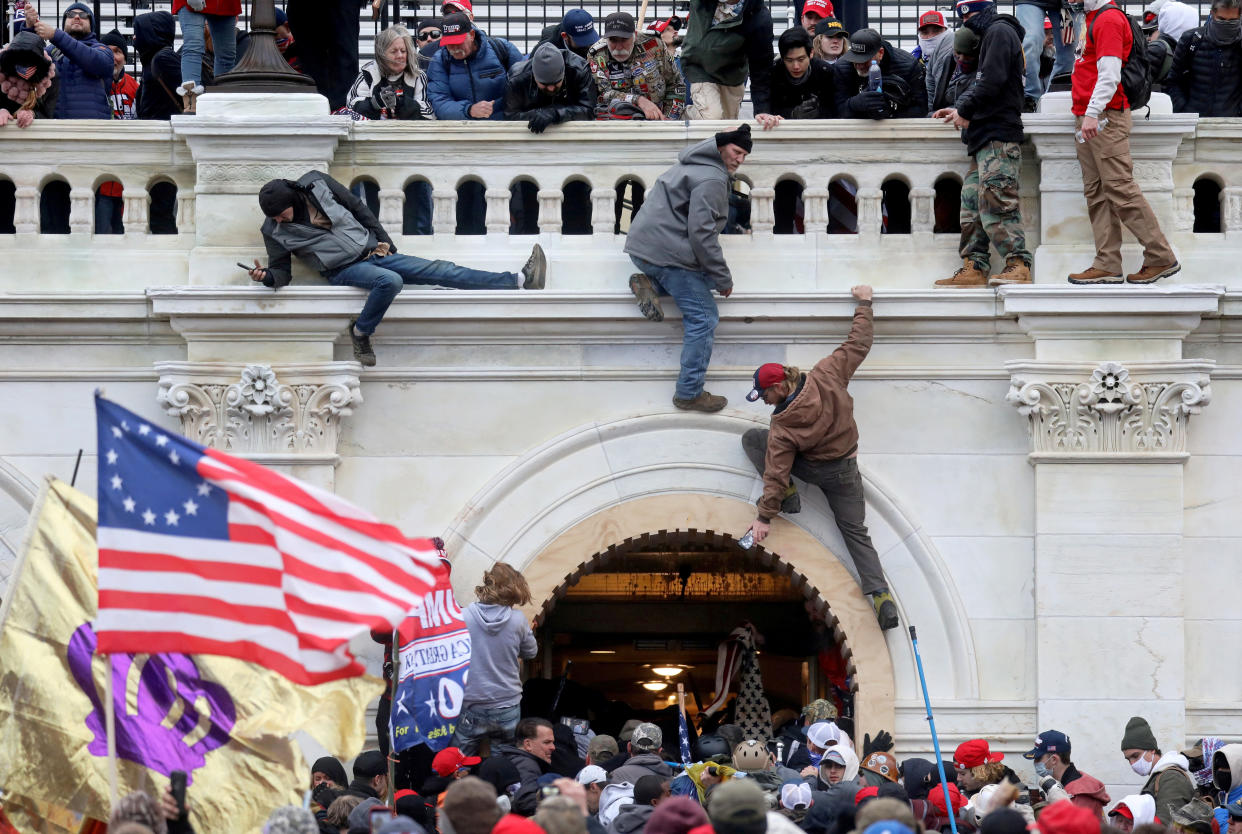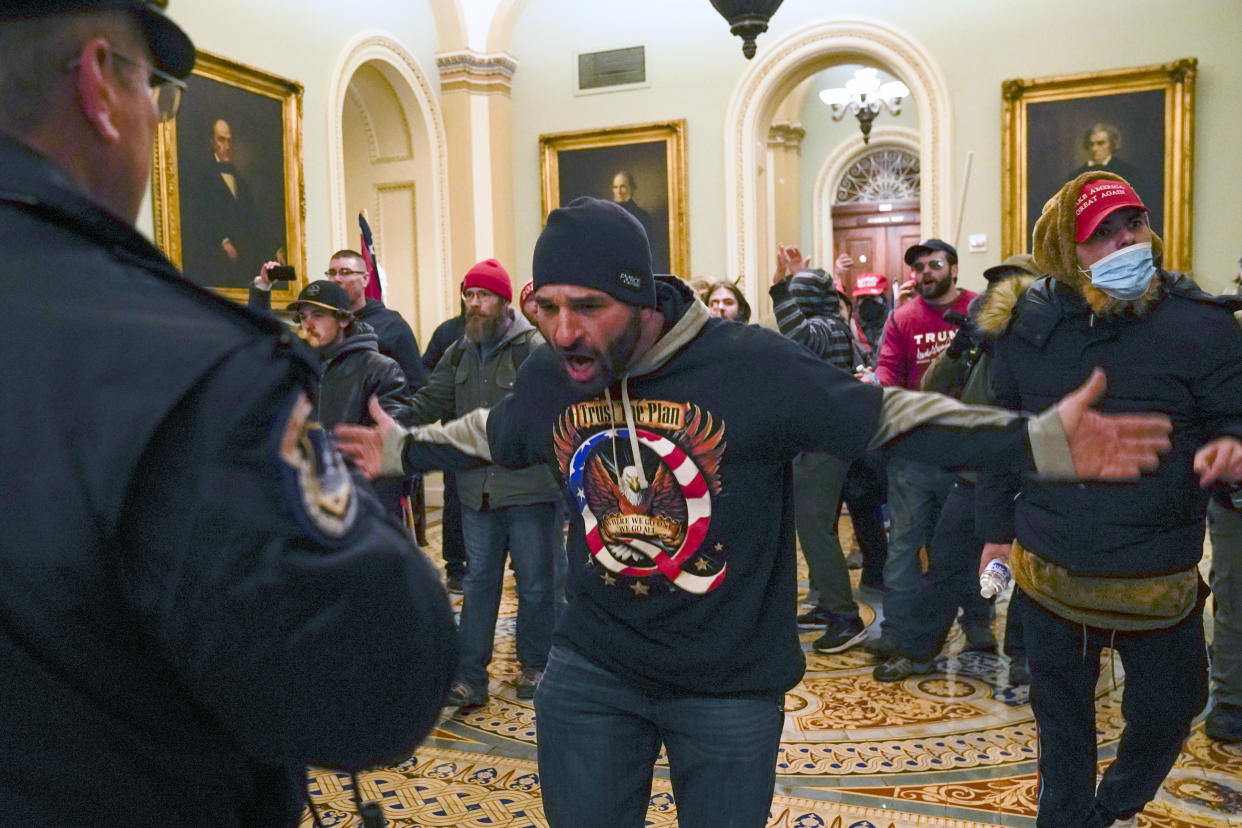Senate report on Jan. 6 attack finds Capitol Police, intelligence agencies failed to relay threat posed by pro-Trump rioters
In the weeks leading up to Jan. 6, the day Congress was scheduled to meet to certify the results of the 2020 presidential election, the Department of Homeland Security’s Office of Intelligence and Analysis struggled to determine whether social media posts calling for supporters of then-President Donald Trump to go to the U.S. Capitol armed and prepared for violence amounted to a legitimate security threat or were simply “online bravado.”
Ultimately, according to a Senate report released Tuesday, both DHS and the FBI concluded that such conversations were not credible, and as a result, neither agency issued an official threat assessment or intelligence bulletin to warn law enforcement about the potential for violence at the Capitol ahead of the riot that unfolded on Jan. 6.
That faulty assessment was among a number of massive intelligence, security and communication failures that contributed to what is described in the report as “a violent and unprecedented attack on the U.S. Capitol, the Vice President, Members of Congress, and the democratic process.”

The bipartisan report is the result of a joint inquiry launched earlier this year by two Senate committees — Rules and Administration, and Homeland Security and Government Affairs — in an effort to understand how, exactly, a violent pro-Trump mob managed to breach the Capitol complex during a joint session of Congress. Its findings and recommendations are based on more than three months of oversight hearings; interviews with current and former law enforcement, intelligence and military officials; and thousands of documents and written statements provided by 50 Capitol Police officers about their experiences. The report links the violence of Jan. 6 to the deaths of seven people, including three police officers who died in the aftermath of the riot.
“The events of January 6th were horrific, and our bipartisan investigation identified many unacceptable, widespread breakdowns in security preparations and emergency response related to this attack,” Sen. Gary Peters, D-Mich., chairman of the Homeland Security and Government Affairs Committee, said in a statement Tuesday.
According to the report, federal intelligence agencies weren’t the only ones that failed to issue appropriate warnings about the potential for violence on Jan. 6. While the U.S. Capitol Police rely primarily on the FBI and DHS for intelligence about potential threats, the committees noted, they also have three internal intelligence components of their own that are supposed to inform the department’s security and operational planning.

According to the report, "USCP’s lead intelligence component — the Intelligence and Interagency Coordination Division ('IICD') — was aware of the potential for violence in the days and weeks ahead of January 6.” The division even issued an investigative research and analysis report on Dec. 21 noting that maps of the Capitol complex’s tunnel system were being circulated online. Other posts mentioned plans to interfere with the electoral vote certification process, and several promoted “confronting members of Congress and carrying firearms during the protest.”
“Bring guns. It’s now or never,” read one post cited in the Dec. 21 report. Another warned that “anyone going armed needs to be mentally prepared to draw down on [law enforcement officers]. Let them shoot first, but make sure they know what happens if they do.” That same report also referred to “Patriot Organizations” expected to participate in events planned for Jan. 6, including the Proud Boys and Oath Keepers, two prominent far-right groups that have been linked to more than three dozen people who have been hit with criminal charges stemming from the Capitol riot.
Despite all this information, the report found that the Capitol Police’s internal intelligence components “failed to convey the full scope of threat information they possessed” to Capitol Police leadership, rank-and-file officers or law enforcement partners. As a result, the Capitol Police were “not adequately prepared to prevent or respond to the January 6th security threats, which contributed to the breach of the Capitol.”

The two Senate committees that authored the report also offered 20 recommended changes, including the creation of a single internal intelligence bureau within the Capitol Police to streamline their information-sharing process, and that the Capitol Police Board empower the Capitol Police chief to request assistance from the D.C. National Guard in emergency situations. They also recommended that federal intelligence agencies review and evaluate their handling of open-source information, such as social media posts, that contain threats of violence, as well as their criteria for issuing intelligence assessments, bulletins and other advisories based on that information.
Senate Rules Committee Chairwoman Amy Klobuchar, D-Minn., promised to “work with my colleagues on both sides of the aisle to implement the recommendations in this report that are needed to protect the Capitol and, in turn, our nation.”
In response to the release of the report, U.S. Capitol Police issued a statement acknowledging the need for improvements in the process of collecting and sharing intelligence within the department, while disputing the notion that the Capitol Police or any other law enforcement agency had any idea that “thousands of rioters were planning to attack the U.S. Capitol.”
“Before January 6, the Capitol Police leadership knew Congress and the Capitol grounds were to be the focus of a large demonstration attracting various groups, including some encouraging violence,” the statement read. However, it continued, there was no “credible intelligence” to suggest that this “large-scale demonstration would become a large-scale attack on the Capitol Building.”
The review is the first congressional report stemming from Jan. 6, and comes nearly two weeks after Republicans in the Senate voted to kill a measure to create an independent commission to study all the circumstances surrounding the Capitol attack.
Among the handful of GOP senators who voted in support of a Jan. 6 commission was Rob Portman of Ohio, the ranking member of the Homeland Security Committee. Portman’s Republican counterpart on the Rules Committee, Missouri Sen. Roy Blunt, opposed the proposal, arguing that it was “too early” to create an independent commission. Blunt insisted that members of Congress should wait for the Senate committees to release the findings and recommendations resulting from their bipartisan probe before moving to create a separate panel.
In a statement Tuesday, Rep. Bennie Thompson, D-Miss., who co-authored the House bill to create a Jan. 6 commission, said that “although this report provides new insight into the many intelligence failures, miscommunications, and security lapses on January 6, it is clear a full and detailed accounting of that day — including influencing factors — is still needed.”
“I hope the Senate will reconsider its inaction on my legislation to create an independent, bipartisan commission to investigate the attack,” Thompson, who serves as chairman of the House Homeland Security Committee, continued. “But if no progress is made soon,” he said, he thinks the Democratic-led House of Representatives “should stand up a bipartisan investigation that is insulated from the political wrangling that has often hamstrung prior multi-committee or select committee investigations.”
____
Read more from Yahoo News:


